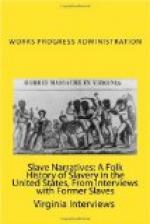Mr. Towns rises at six o’clock each morning, often earlier. Makes his bed (he has never allowed anyone to make his bed for him) and because it is still dark has to lie across the bed to await the breaking of day. His health is very good and his appetite strong.
Upon the occasion of his one-hundredth birthday, December 24, 1935, his daughter Mrs. Houston gave him a child’s party and invited one hundred guest; one hundred stockings were made, filled with fruits, nuts and candies and one given each guest. A huge cake with one hundred candles adorned the table and during the party, he cut the cake. At this party, he showed all the joys and pleasures of a child. His other daughter Mrs. E.L. McMillan, of New York City, and son, Mr. George Towns, for years an instructor in Atlanta University, Atlanta, Georgia, were present for the occasion.
Mr. Towns has been noted during his lifetime for having a remarkable memory and has many times publicly delivered orations from many of Shakespeare’s works. His memory began failing him in 1936.
He is very well educated and now spends most of his time sitting on the porch reading the Bible. (2)
REFERENCES
1. Luke Towns, 1225 West Eighth Street, Jacksonville, Florida
2. Mary Houston, daughter of Luke Towns, 1225 West Eighth Street Jacksonville, Florida
FEDERAL WRITERS’ PROJECT American Guide, (Negro Writers’ Unit)
Viola B. Muse
Jacksonville, Florida
March 20, 1937
WILLIS WILLIAMS
Willis Williams of 1025 Iverson Street, Jacksonville, Florida, was born at Tallahassee, Florida, September 15, 1856. He was the son of Ransom and Wilhemina Williams, who belonged during the period of slavery to Thomas Heyward, a rich merchant of Tallahassee. Willis does not know the names of his paternal grandparents but remembers his maternal grandmother was Rachel Fitzgiles, who came down to visit the family after the Civil War.
Thomas Heyward, the master, owned a plantation out in the country from Tallahassee and kept slaves out there; he also owned a fine home in the city as well as a large grocery store and produce house.
Willis’ mother, Wilhemina, was the cook at the town house and his father, Williams, did carpentry and other light work around the place. He does not remember how his father learned the trade, but presumes that Mr. Heyward put him under a white carpenter until he had learned. The first he remembers of his father was that he did carpentry work.
At the time Willis was born and during his early life, even rich people like Mr. Heyward did not have cook stoves. They knew nothing of such. The only means of cooking was by fireplace, which, as he remembers, was wide with an iron rod across it. To the rod a large iron pot was suspended and in it food was cooked. An iron skillet with a lid was used for baking and it also was used to cook meats and other food. The common name for the utensil was ‘spider’ and every home had one.




